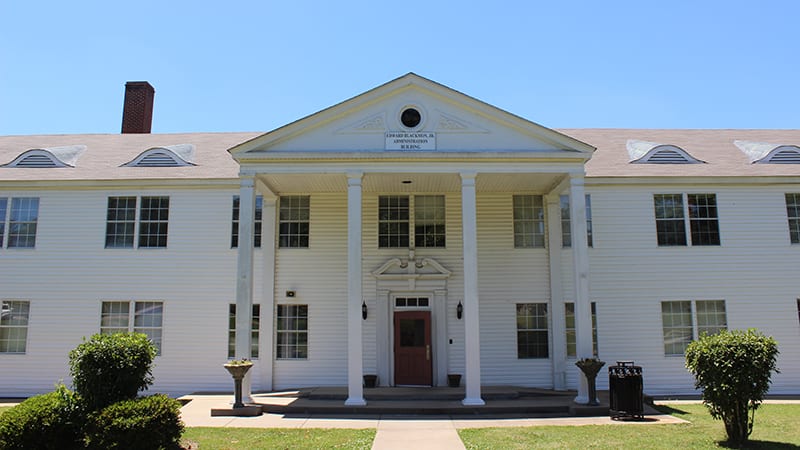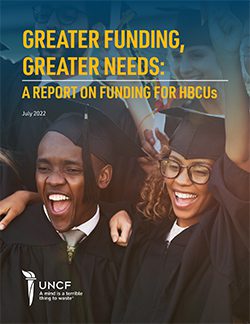Why HBCUs Need More–More Support and More Funding

A message from Lodriguez Murray, UNCF’s Senior Vice President, Public Policy and Government Affairs

Lodriguez Murray
I am reaching out to share our new report on how HBCUs have been funded in the first two years of the pandemic, called Greater Funding, Greater Needs: A Report on Funding for HBCUs. As you know, we at UNCF have worked for the last 78 years to ensure that HBCUs have the resources to educate as many talented, deserving students as they can, empowering more than half a million get to and through college successfully.
Surely, our HBCUs are the “little engines that could.” Over the last two years, they have persevered and turned on a dime to ensure students could attend college, learn and earn their degrees as never before—most having to build new digital infrastructure to enable remote learning. HBCUs’ power to make the difference for students in need and who might not otherwise be able to attend college is dramatic and life-altering.
Yet, during the last same two years, the difficulties faced by both our students and our HBCUs have surfaced like no other time in our history. The dual pandemics of racism and COVID-19 have opened new wounds and new visibility to those wounds, showing that Black students are often left behind at the slightest push from an outside force or agenda.
To combat the financial deficits and lack of support for our schools, we have ramped up our efforts to make sure all HBCUs continue to have the proper tools and resources to get as many students across the finish line as possible. We truly believe education—especially higher education—is the great equalizer, lifting so many to untold accomplishments.
During the last two years, many others have joined us and stepped up their support to bridge the gap in funding HBCUs have traditionally experienced—one that most other American colleges and universities don’t have. We thank the federal government and many corporations, foundations and individual donors for their financial support of our schools.
 But, it’s still not enough, and Greater Funding, Greater Needs: A Report on Funding for HBCUs outlines many of the deficits our HBCUs and their students continue to face:
But, it’s still not enough, and Greater Funding, Greater Needs: A Report on Funding for HBCUs outlines many of the deficits our HBCUs and their students continue to face:
- Nearly two-thirds of the HBCUs surveyed indicated they each had more than $5 million in deferred maintenance. According to the U.S. Government Accountability Office, public HBCUs, on average, have total deferred maintenance of more than $60 million.
- Endowments of HBCUs are just a fraction of their non-HBCU counterparts, according to the UNCF report.
- Federal spending bills such as Build Back Better and the IGNITE HBCU Excellence Act would allocate significant levels of funding to HBCUs, but they are currently stalled in Congress.
Our solution to this problem is a three-pronged approach, requesting sustained, targeted funding for HBCUs:
- Ask that the federal government commit to fund HBCUs, collectively, at federally mandated levels going forward while providing extra funds to address the deferred maintenance backlog.
- Rally public- and private-sector donors to help HBCUs attain unrestricted funds to obtain parity in their endowments.
- Capitalize on the greater awareness of HBCUs to attract a higher level of contributions from private donors and reinforce the importance of unrestricted gifts.
We invite you to read our report and particularly let your members of Congress—both of your senators and your representative—that the current situation is not acceptable. Fund our HBCUs—a group of exceptional institutions and that make a way even when there isn’t one—to Invest in Better Futures® for students who truly deserve better.